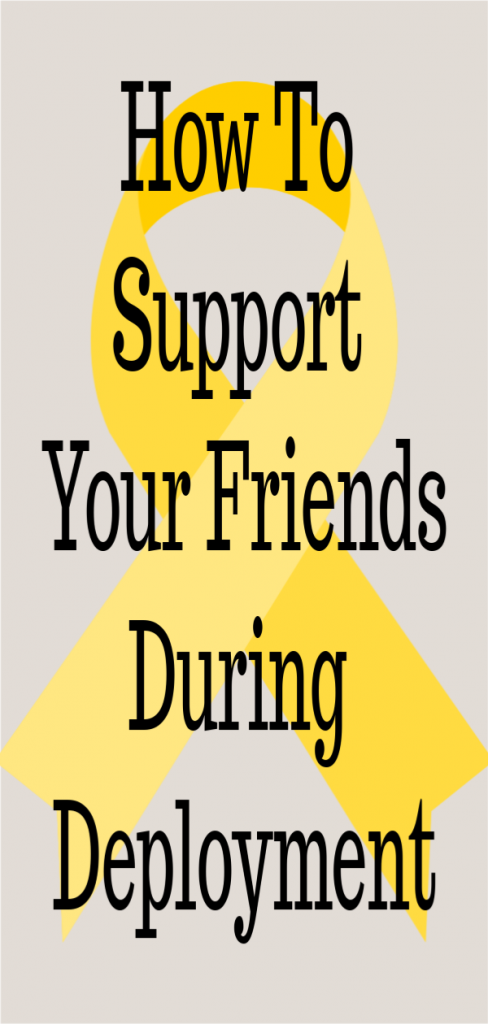Chances are that somebody you know has been affected by a military deployment. My own family has been through about a half dozen deployments both inside of and outside of the United States, and if you include our extended family that number more than doubles. Friends of a deployed soldier or military spouse often have no idea how to be supportive and sometimes do nothing out of sheer lack of ideas or fear of bringing the deployment up. I spoke with several other military wives and reflected on my own experiences and came up with these suggestions on how to support your friends during a deployment. I hope some of them are helpful to you. Since I am an Army wife, many of these suggestions will be focused on helping the wife of a deployed soldier, since that is my personal experience.
Offer Specific Help
Well-meaning people often ask family members affected by deployment “what can I do to help?” or offer “call if you need me.” However, this puts the burden on the family member to come up with ways you can help them, and most military families I know are unlikely to ask for help. General offers of help are good to hear, but should be followed up with specific offers for support. Here are some specific ways you can offer to help the family from time to time:
- Offer to bring dinner over a few times during the deployment.
- Volunteer to run to the grocery store and pick up some items on her list, or offer to watch the kids while she does it.
- Volunteer to do yard work or other chores the deployed spouse usually does.
- If you are close enough with the family, offer to take the kids out from time to time.
Include the Family In Your Life
Even though your friend might not tell you, living through a deployment can get very lonely. As a National Guard family, I find this especially true since we do not live on or near a base surrounded by military families that are going through the same things. Loneliness and a feeling of disconnect can creep in quickly when you are the only person you know who is going through a deployment. However, military spouses often fear becoming a third wheel and will rarely invite themselves along on outings.
Because of this, consider inviting the family along on your family outings every once in a while. Some examples of this include your family dinners, trips to the movies, Christmas caroling, sporting events, or any fun family-outing.
What NOT to Do
- Do not offer your unsolicited opinion of the war or campaign the soldier is deployed to.
- Try not to compare your spouse’s business trips to her husband’s deployment.
- Don’t remind her that her husband could die – trust me, she knows.
- Don’t ignore the deployment, but do not make it the focus of your relationship with the family.
- Do not offer to help out if you really don’t intend to.
- If you offer to help and are turned down, do not take it personally. Everyone deals with deployment in their own way.
- If you offer to help and are turned down, do not stop offering your help. The family may still need help later.
- Under no circumstance should you share with random people the fact that the soldier is deployed. The last thing a military wife needs is for the guy at the corner store to know she is all by herself at night.

Helping the Soldier
The best way to help the soldier is to support his or her family back at home. Other meaningful gestures include sending letters, postcards, pictures, care packages, and phone cards (it is expensive to call back home). Soldiers in the field rarely have spare time, so do not be discouraged if the soldier does not respond to your communication. If they only have time to write one letter or answer one email, it is likely going to be to their own family.
If you are the employer of a soldier, go above and beyond the legal employment requirements. Consider sending a care package to the soldier and the family. Let them know they are not forgotten.
Most Importantly
Be a friend and be present. Know that your friend may be carrying a heavy load they are not willing to share with you, but also let them know they can call you when they need to talk. Most importantly, do not forget the family when the soldier comes home. While they will certainly want some family alone time when they are reunited, they are in no way done with the deployment experience. For many soldiers, a new battle is just beginning – reintegration.
The friends and family members that have been there for me during my husband’s deployments have forged relationships that cannot be broken. There is no way I could have made it through without my family, best girlfriends, and my faith.
“I thank my God every time I remember you.” – Philippians 1:3









Growing up in the Military I know what this means. I love your ideas!
Amazing advice! Thank you.
You are welcome.:)
“What can I do to help?” Usually that is a great question, but now I now it may not necessarily be the best question in this circumstance. Thanks Janice!
Q: Do active duty service members have health/medical insurance? A: In the strictest sense active duty don’t have insurance. They receive all care from a military facility. If they need to receive care outside of a military facility it is the responsibility of the care facility which covers their unit/location. That military treatment facility arranges for, and pays for their care. Emergencies are covered and paid for by their local military treatment facility. An active duty soldier’s ID card (and their eligible family members’ military ID cards) serve as verification that they are eligible for medical care through the military. They may also receive a TRICARE card although care is paid for my their servicing military treatment facility. To make a long story short, active duty military and their eligible family members have free medical care. Nothing in the civilian community can even come close to this benefit.
With all due respect, military health insurance is not free. It is a benefit provided in exchange for their service. The civilian community doesn’t generally go into battle and put their lives on the line.
This post is not about financially supporting military families. Most of them would never ask for that anyway. This post is about standing beside a friend or family member who is going through a hard situation with a loved one in mortal danger.
I have had family members get deployed and I see the heartache that it causes. I hope that I am there enough for the ones who are dealing with this on a more personal level than I. Thanks for the tips on how to improve my deployment ettiquette.
Thankyou my friend’s husband has just recently been deployed and so I was looking for some advice and found this, it really helps and I think I know how I can be there for her better now.
So glad to have helped. 🙂 You sound like a caring friend.
Good day! Do you know if they make any plugins to
assist with Search Engine Optimization? I’m trying to get my blog to rank for some targeted keywords but I’m
not seeing very good success. If you know of any please share.
Thank you!
This is SO good and SO true. I’ve been meaning to write a similar post like this for years–but never found the right words. Thank you so much for doing it for me so I can share this around. <3 Thank you so much for your service and sacrifice to this country!
Thanks for the compliment. 🙂 I appreciate it.
YES!!!! I’ve wanted to write this post for a long while but you did it for me. This part “The best way to help the soldier is to support his or her family back at home. ” Sooo true! I got very few offers for help but I did have people ask what they could do to help my husband. I was having such a hard time, but felt guilty saying “You can help him by offering to help ME!” <3